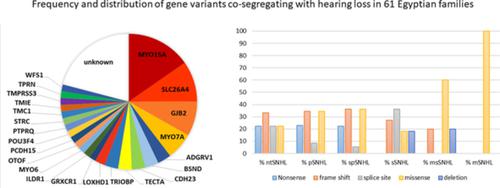当前位置:
X-MOL 学术
›
Clin. Genet.
›
论文详情
Our official English website, www.x-mol.net, welcomes your
feedback! (Note: you will need to create a separate account there.)
Comprehensive molecular analysis of 61 Egyptian families with hereditary nonsyndromic hearing loss.
Clinical Genetics ( IF 2.9 ) Pub Date : 2020-04-11 , DOI: 10.1111/cge.13754 Birgit S Budde 1 , Maha Abdelgaber Aly 1, 2 , Mostafa R Mohamed 2 , Andreas Breß 3 , Janine Altmüller 1 , Susanne Motameny 1 , Amit Kawalia 1 , Holger Thiele 1 , Kathryn Konrad 1 , Christian Becker 1 , Mohammad R Toliat 1 , Gudrun Nürnberg 1 , Eman Abdel Fattah Sayed 2 , Enass Sayed Mohamed 2 , Markus Pfister 3, 4 , Peter Nürnberg 1, 5, 6
Clinical Genetics ( IF 2.9 ) Pub Date : 2020-04-11 , DOI: 10.1111/cge.13754 Birgit S Budde 1 , Maha Abdelgaber Aly 1, 2 , Mostafa R Mohamed 2 , Andreas Breß 3 , Janine Altmüller 1 , Susanne Motameny 1 , Amit Kawalia 1 , Holger Thiele 1 , Kathryn Konrad 1 , Christian Becker 1 , Mohammad R Toliat 1 , Gudrun Nürnberg 1 , Eman Abdel Fattah Sayed 2 , Enass Sayed Mohamed 2 , Markus Pfister 3, 4 , Peter Nürnberg 1, 5, 6
Affiliation

|
Nonsyndromic hearing loss is an extremely heterogeneous disorder. Thus, clinical diagnostics is challenging, in particular due to differences in the etiology of hearing loss between populations. With this study, we wanted to elucidate the genetic basis of hearing loss in 61 consanguineous Egyptian families. In 25 families, linkage analysis was used as a prescreening to identify regions for targeted sequencing of candidate genes. Initially, the coding regions of 12 and later of 94 genes associated with hearing loss were enriched and subjected to massively parallel sequencing (MPS) with diagnostic yields of 36% and 75%, respectively. Causative variants were identified in 48 families (79%). They were found in 23 different genes with the majority being located in MYO15A (15.3%), SLC26A4 (9.7%), GJB2 (8.3%), and MYO7A (6.4%). As many as 32 variants were novel ones at the time of detection. Five variants were shared by two, three, or even four families. Our study provides a first survey of the mutational spectrum of deaf patients in Egypt revealing less GJB2 variants than in many European populations. It underlines the value of targeted enrichment of well‐selected deafness genes in combination with MPS in the diagnostics of this frequent and genetically heterogeneous disorder.
中文翻译:

对61个遗传性非综合征性听力损失的埃及家庭的全面分子分析。
非综合征性听力损失是一种极为不同的疾病。因此,特别是由于人群之间听力损失的病因学差异,临床诊断具有挑战性。通过这项研究,我们希望阐明61个近亲埃及家庭的听力损失的遗传基础。在25个家族中,连锁分析被用作预筛选,以鉴定候选基因的靶向测序区域。最初,丰富和与听力损失相关的94个基因的12个编码区和后来的编码区,经过大规模平行测序(MPS)处理,诊断率分别为36%和75%。在48个家庭(79%)中发现了致病变异。它们存在于23种不同的基因中,其中大多数位于MYO15A(15.3%),SLC26A4(9.7%),GJB2(8.3%)和MYO7A(6.4%)。在检测时,多达32个变体是新颖的。两个,三个甚至四个家庭共享了五个变体。我们的研究首次对埃及聋人患者的突变谱进行了调查,结果显示与许多欧洲人群相比,GJB2变异体更少。它强调了与MPS结合使用精选富耳聋基因的目标富集在诊断这种常见的遗传异质性疾病中的价值。
更新日期:2020-04-11
中文翻译:

对61个遗传性非综合征性听力损失的埃及家庭的全面分子分析。
非综合征性听力损失是一种极为不同的疾病。因此,特别是由于人群之间听力损失的病因学差异,临床诊断具有挑战性。通过这项研究,我们希望阐明61个近亲埃及家庭的听力损失的遗传基础。在25个家族中,连锁分析被用作预筛选,以鉴定候选基因的靶向测序区域。最初,丰富和与听力损失相关的94个基因的12个编码区和后来的编码区,经过大规模平行测序(MPS)处理,诊断率分别为36%和75%。在48个家庭(79%)中发现了致病变异。它们存在于23种不同的基因中,其中大多数位于MYO15A(15.3%),SLC26A4(9.7%),GJB2(8.3%)和MYO7A(6.4%)。在检测时,多达32个变体是新颖的。两个,三个甚至四个家庭共享了五个变体。我们的研究首次对埃及聋人患者的突变谱进行了调查,结果显示与许多欧洲人群相比,GJB2变异体更少。它强调了与MPS结合使用精选富耳聋基因的目标富集在诊断这种常见的遗传异质性疾病中的价值。











































 京公网安备 11010802027423号
京公网安备 11010802027423号